
Celebrating 90 years
“We are going to form a band and we are going to aim high”.
That was the message relayed by Fred Felton, the Managing Director of a small shoe making firm to a local Northampton newspaper reporter in January 1933.
It was to prove no idle boast either.
Within two years the Munn & Felton Band was National Champion – the first major success of a band that 90 years later continues to strive for the highest levels of excellence.
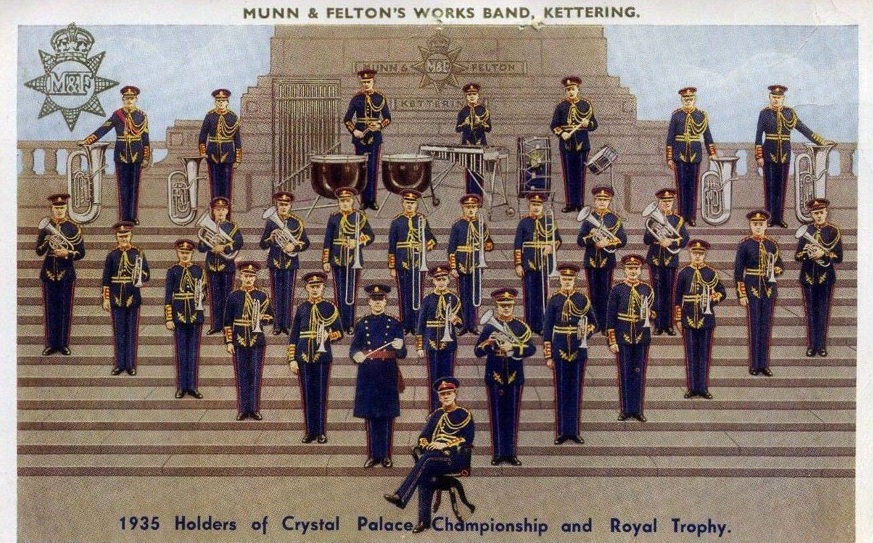
1935 National Champion
Boots & bands
Felton and his brother Bert arrived in the market town of Kettering in 1922. Sons of itinerant Salvationists, it was to become their much longed for home.
Kettering was already known as a ‘boots and bands’ town – a myriad of small firms providing a ready supply of amateur musicians for the likes of the relatively successful Kettering Rifles and Rushden Temperance Bands.
Soon Fred and Bert linked up with Albert E Munn, bandmaster of the local Kettering Salvation Army Band. A stickler for high standards in commerce as well as music, his family was part of the Munn & Carver shoemaking firm.
Clash
Determined to succeed, the brothers started by selling shoelaces door to door - their aptitude for hard work and business acumen soon seeing them gain promotion. Inevitably the ambition to succeed on Fred’s part brought a clash in personalities with the stern, patrician figure of Munn, and he decided to leave the Citadel Band – eventually taking 12 players with him.
With a willing core of players (including those who left the Citadel Band with him) he spent £400 on instruments to create the Munn & Felton Works Band – its ranks boosted further after posting a local advert, by the arrival of a young man called Stanley Boddington.
However, his success at the firm soon saw him become joint Managing Director and in early 1933 he decided to form a company band.
With a willing core of players (including those who left the Citadel Band with him) he spent £400 on instruments to create the Munn & Felton Works Band – its ranks boosted further after posting a local advert, by the arrival of a young man called Stanley Boddington.
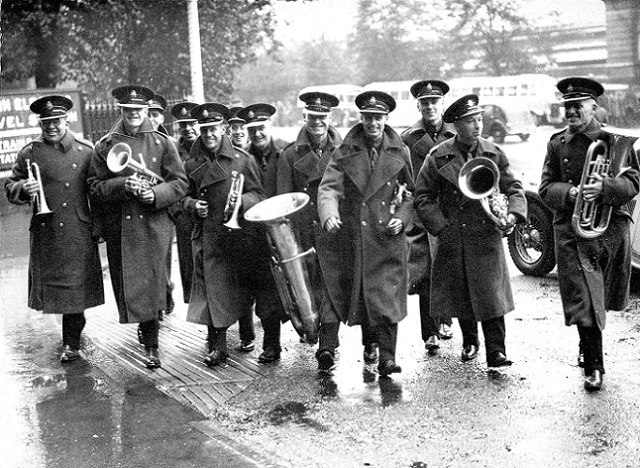
Arriving at the Crystal Palace in 1935
Secure employment
Others followed, attracted by the prospect of the offer of secure factory employment. The talented Elgar Clayton came from Wingates, whilst the star capture was euphonium player Bert Sullivan, who despite his banding fame had been unemployed for three years.
He later recalled that after just one rehearsal the band went the following day to a local contest and won first prize. Sullivan claimed the ‘Best Soloist’ prize and went on to become Felton’s talent scout.
“I travelled the length and breadth of the country searching out the players we wanted,” he said. “We could offer work and a band - and that was a powerful combination in those days.”
A bandroom and ornate uniforms followed – as did a new conductor in the form of William Halliwell.
Years later Stanley Boddington said of him: “I worshipped the ground he walked on. He was a wonderful band trainer with the ability to make players want to do well for him.”
Years later Stanley Boddington said of him: “I worshipped the ground he walked on. He was a wonderful band trainer with the ability to make players want to do well for him.”
Thousands
The National victory of 1935 was certainly deserved, if fortuitous – coming as it did in the integrum between Foden’s ‘double’ hat-trick of wins at Crystal Palace. The seeds though had been planted. Ten thousand people turned out to greet the champions who marched through the streets of Kettering on their return on the Monday morning
Emboldened, the brothers now drove the band forward (Fred as President, Bert as Secretary), although the Second World War impacted things greatly. Only four players remained when the full draft took place, and the band was effectively mothballed for over six years. 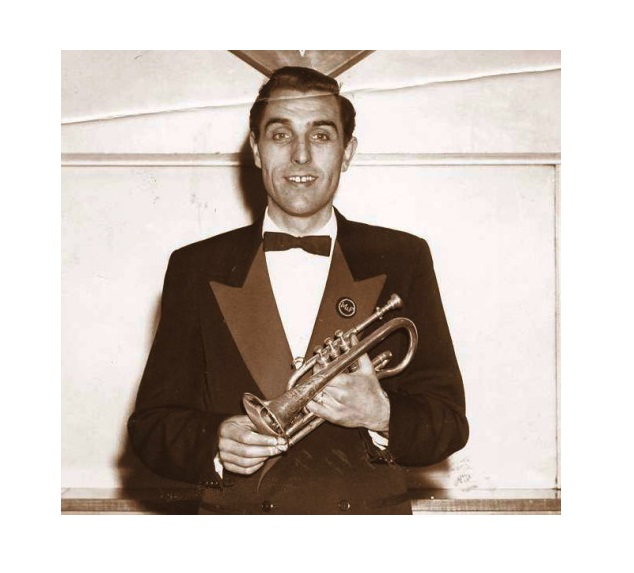
James Scott
Munn & Felton did not compete on contesting’s 'National' resumption in 1945 as new players had to be sought. One was to be a 22-year cornet player called James Scott (above).
He auditioned for the first of his two stints with the band in 1947 on the factory floor surrounded by rolls of leather hide and a silent Stanley Boddington.
Boddington’s appointment as Resident Conductor was the catalyst for success.
Fred Felton later took him aside and said; “Stanley’s very enthusiastic about you and your playing”.
As Scott later recalled. “It was then I found out Stan wasn’t a man of many words. I got a job at the factory and in the band. My pay was £6 10s a week.”
Boddington’s appointment as Resident Conductor was the catalyst for success.

Stanley Boddington alongside Harry Mortimer in rehearsal
Discipline
Rehearsals, as James Scott recalled were “disciplined” – from the moment Bert Felton welcomed players at the top of the stairs before entering (always at least 3 minutes early) to the sign under the bandroom clock that read: ‘Harmony sublime – always on time.’
Extended summer tours maintained the exacting standards. “The schedule was killing”, James said. “In a three - week season at Scarborough (below) we used to do three concerts a day.
About two weeks in there we used to get the Belle Vue test piece. Stanley used to wait until a rainy evening, then put it out on the music stands. We used to give a very passable performance, in the rain, the first time we’d ever set eyes on it.”

Number 1
Harry Mortimer became professional adviser, but further major success eluded the band until the British Open at Belle Vue in 1954. He was due to take them on ‘Tournament for Brass’ but due to ill health he could not travel from Jersey where he was recuperating.
Undeterred, Stanley Boddington conducted a rehearsal performance over the telephone, after which Mortimer reportedly said: “Play like that and you won’t go far wrong.”
They did just that – and from the number 1 draw. No band has won the Open as the first band to play since.
Each win was regarded by him as special in its own way, but it was the 1964 victory on ‘Variations on a Ninth’ that he regarded as the finest, as it was achieved against a CWS (Manchester) Band at the very zenith of its brilliance.
Finest
Mortimer returned to lead the National success of 1955, but Stanley Boddington subsequently conducted at all the major contests, claiming National titles in 1957, 1960, 1964 and 1966.
Each win was regarded by him as special in its own way, but it was the 1964 victory on ‘Variations on a Ninth’ that he regarded as the finest, as it was achieved against a CWS (Manchester) Band at the very zenith of its brilliance.
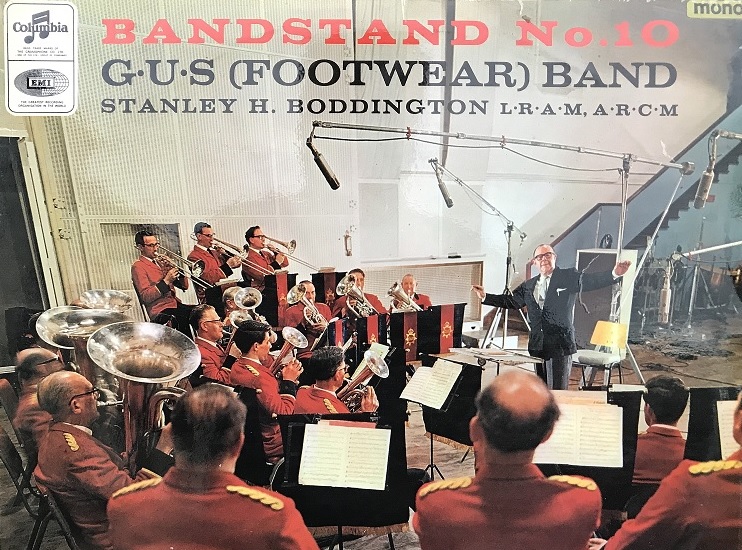
Recorded on numerous times for posterity
Golden epoch
In 1956 Fred Felton retired, followed a little later by Bert. In 1962 the Munn & Felton factories had been sold to the massive GUS conglomerate, and in April of that year the band changed its name to the one with which it became synonymous – GUS (Footwear).
This was the golden epoch of the band in which they were arguably the finest in the world.
This was the golden epoch of the band in which they were arguably the finest in the world.
The huge cache of memorable LP recordings was backed by considerable individual and ensemble excellence, with the close association with composer Gilbert Vinter seeing the famous GUS Quartet of John Berryman, David Read, John Cobley and Trevor Groom claim a hat-trick Great Britain titles in 1966-68 playing his works.
The band’s World Championship success of 1971 was a fitting coda.
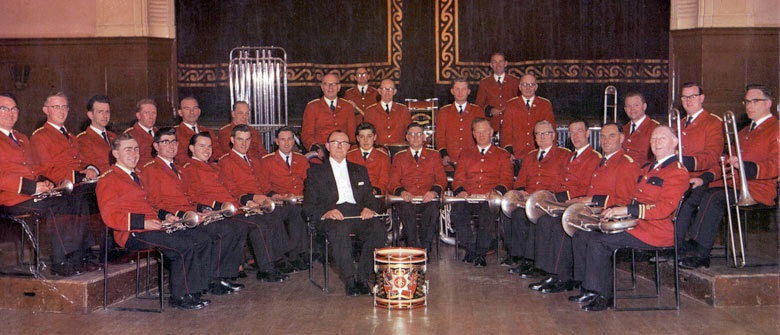
The best band in the world
Major changes
The 1970’s saw major changes - the footwear industry declined (seeing the band move from and then return to Kettering) and no longer able to offer employment to potential players.
Stanley Boddington retired in 1975 after 42 years of service shortly after his 70th birthday. His contribution to the banding movement was further marked by the award of the MBE in 1981.
The GUS name (in parts) remained, and whilst major title success eluded them, they remained a formidable and much respected contender for honours under the likes of Geoffrey Brand and Keith Wilkinson.
Stanley Boddington retired in 1975 after 42 years of service shortly after his 70th birthday. His contribution to the banding movement was further marked by the award of the MBE in 1981.
Elusive silverware
His tenure almost ended the long wait for further major titles (runner-up at the Open in 1980 and third at the Nationals in 1983 as well as being BBC Band of the Year in 1982), but it was the appointment of a youthful Bramwell Tovey (below) as professional conductor in in 1986 to work alongside former principal cornet John Berryman as Resident Conductor that finally brought back elusive silverware.
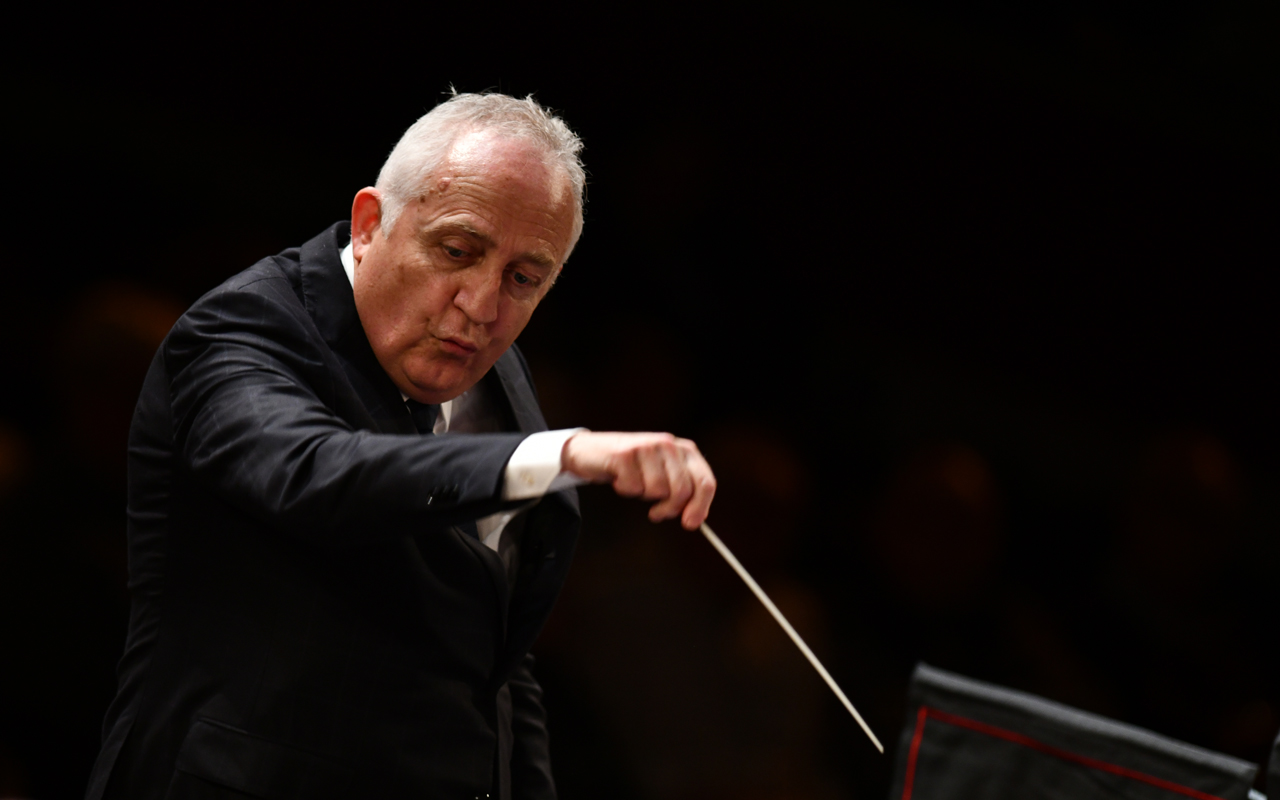
Open victory again
In 1987 the band was rather clumsily retitled Rigid Containers Group Band after new sponsorship was gained. 54 years of footwear association may have ended, but they had a new spring in its step (coming third at the 1986 Open).
The 1988 British Open victory on ‘Contest Music’ was a remarkable achievement - one that perhaps could have been built on further if their mercurial MD’s talents had not taken him into a different firmament of professional musical achievement.
The 1988 British Open victory on ‘Contest Music’ was a remarkable achievement - one that perhaps could have been built on further if their mercurial MD’s talents had not taken him into a different firmament of professional musical achievement.
Decline
Instead it marked a last hurrah, and the start of a slow decline in major contesting fortunes as well as further name changes (one top-six finish at the British Open followed before the band lost its status in 2003 – returning in 2009 but being relegated to the Grand Shield in 2014 where they remain at present. The National has seen just two top-six finishes since 2000).

New direction and renewed determintation under David Thornton
The band has enjoyed success though at Midland Regional Championships level (including a run of five successive victories under MD, Adam Cooke from 2014-2018) as well as winning the Butlins and All England Masters titles.
Aim high
Now, as the GUS Band embarks on its 90th anniversary, there is a renewed sense of determination to once again “aim high” as their founding father figure remarked.
A new conducting team comprising Christopher Bond (Resident Conductor and Musical Director), Stephen Bell (Associate Conductor) and David Thornton (Professional Conductor) will steer the musical path back they hope to the British Open and regular Albert Hall appearances, whist a hard working administrative team is once again raising its profile.
Fred and Bert Felton will be looking on proudly from above.
Tim Mutum













